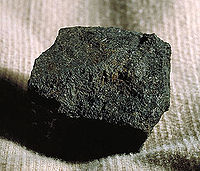
Photo from wikipedia
Abstract Modeling and optimization of multiple quality response characteristics (i.e., ash content and calorific value) has been a very important issue that can assure the quality conformance and stability for… Click to show full abstract
Abstract Modeling and optimization of multiple quality response characteristics (i.e., ash content and calorific value) has been a very important issue that can assure the quality conformance and stability for coal preparation system with multiple operating stages. Although extensive research works have been reported on multistage and multiple responses optimization problem, the traditional physical based model and statistical cause-effect model reaches its limits due to the fast increasing complexity, nonlinearity and high-dimensionality of modern coal preparation system. In addition, these conventional modeling and optimization methods have poor self-adaption and self-learning ability to different operation conditions. Internet-of-things and cyber manufacturing techniques make it convenient to collect larger volumes of sensor data that can provide powerful support for efficient data analytics. The combination of massive industrial data, advanced machine learning models and intelligent optimization algorithms bring new opportunities to deal with these problems. Therefore, this paper attempts to propose a hybrid intelligent technique based multistage and multi-response optimization approach for serial coal preparation system. Firstly, using the support vector regression theory, we construct a mechanism-data hybrid driven and forward-iteration model to reflect the change and propagation mechanism of quality response characteristics along the stage. Secondly, combining with the constructed response models and modified desirability function, the genetic algorithm based backward-iteration optimization search method is presented to determine the globally best processing setting conditions. A real life case study is used to verify the usefulness of proposed approach. Additionally, the performance of surrogate models based on different propagation modeling mode, kernel parameter optimization methods and modeling techniques are comprised and discussed. The results show the effectiveness and superiority of proposed approach.
Journal Title: Journal of Manufacturing Systems
Year Published: 2018
Link to full text (if available)
Share on Social Media: Sign Up to like & get
recommendations!